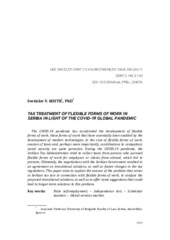Tax treatment of flexible forms of work in Serbia in light of the COVID-19 global pandemic
Abstract
The COVID-19 pandemic has accelerated the development of flexible forms of work, those forms of work that have essentially been enabled by the development of modern technologies. In the case of flexible forms of work, evasion of taxes and, perhaps more importantly, contributions to compulsory social security are quite pervasive. During the COVID-19 pandemic, the Serbian Tax Administration tried to collect taxes from persons who pursued flexible forms of work for employers or clients from abroad, which led to protests. Ultimately, the negotiations with the Serbian Government resulted in an agreement on transitional solutions, as well as future changes in the tax regulations. This paper aims to explain the essence of the problem that arises in Serbian tax law in connection with flexible forms of work, to analyze the proposed transitional solutions, as well as to offer some suggestions that could lead to longer-term solutions to this problem.
Keywords:
schedular taxation / independence test / global services market / false self-employmentSource:
Anali Pravnog fakulteta u Beogradu, 2022, 70, 4, 1147-1162Publisher:
- Univerzitet u Beogradu - Pravni fakultet, Beograd
Collections
Institution/Community
Pravni fakultet / Faculty of Law University of BelgradeTY - JOUR AU - Kostić, Svetislav PY - 2022 UR - https://ralf.ius.bg.ac.rs/handle/123456789/1348 AB - The COVID-19 pandemic has accelerated the development of flexible forms of work, those forms of work that have essentially been enabled by the development of modern technologies. In the case of flexible forms of work, evasion of taxes and, perhaps more importantly, contributions to compulsory social security are quite pervasive. During the COVID-19 pandemic, the Serbian Tax Administration tried to collect taxes from persons who pursued flexible forms of work for employers or clients from abroad, which led to protests. Ultimately, the negotiations with the Serbian Government resulted in an agreement on transitional solutions, as well as future changes in the tax regulations. This paper aims to explain the essence of the problem that arises in Serbian tax law in connection with flexible forms of work, to analyze the proposed transitional solutions, as well as to offer some suggestions that could lead to longer-term solutions to this problem. PB - Univerzitet u Beogradu - Pravni fakultet, Beograd T2 - Anali Pravnog fakulteta u Beogradu T1 - Tax treatment of flexible forms of work in Serbia in light of the COVID-19 global pandemic EP - 1162 IS - 4 SP - 1147 VL - 70 DO - 10.51204/Anali_PFBU_22407A UR - conv_591 ER -
@article{
author = "Kostić, Svetislav",
year = "2022",
abstract = "The COVID-19 pandemic has accelerated the development of flexible forms of work, those forms of work that have essentially been enabled by the development of modern technologies. In the case of flexible forms of work, evasion of taxes and, perhaps more importantly, contributions to compulsory social security are quite pervasive. During the COVID-19 pandemic, the Serbian Tax Administration tried to collect taxes from persons who pursued flexible forms of work for employers or clients from abroad, which led to protests. Ultimately, the negotiations with the Serbian Government resulted in an agreement on transitional solutions, as well as future changes in the tax regulations. This paper aims to explain the essence of the problem that arises in Serbian tax law in connection with flexible forms of work, to analyze the proposed transitional solutions, as well as to offer some suggestions that could lead to longer-term solutions to this problem.",
publisher = "Univerzitet u Beogradu - Pravni fakultet, Beograd",
journal = "Anali Pravnog fakulteta u Beogradu",
title = "Tax treatment of flexible forms of work in Serbia in light of the COVID-19 global pandemic",
pages = "1162-1147",
number = "4",
volume = "70",
doi = "10.51204/Anali_PFBU_22407A",
url = "conv_591"
}
Kostić, S.. (2022). Tax treatment of flexible forms of work in Serbia in light of the COVID-19 global pandemic. in Anali Pravnog fakulteta u Beogradu Univerzitet u Beogradu - Pravni fakultet, Beograd., 70(4), 1147-1162. https://doi.org/10.51204/Anali_PFBU_22407A conv_591
Kostić S. Tax treatment of flexible forms of work in Serbia in light of the COVID-19 global pandemic. in Anali Pravnog fakulteta u Beogradu. 2022;70(4):1147-1162. doi:10.51204/Anali_PFBU_22407A conv_591 .
Kostić, Svetislav, "Tax treatment of flexible forms of work in Serbia in light of the COVID-19 global pandemic" in Anali Pravnog fakulteta u Beogradu, 70, no. 4 (2022):1147-1162, https://doi.org/10.51204/Anali_PFBU_22407A ., conv_591 .



